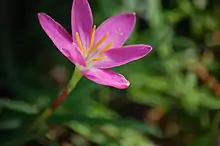Zephyranthes minuta
Zephyranthes minuta is a plant species very often referred to as Zephyranthes grandiflora, including in Flora of North America.[2] The latter is, however, an illegitimate name because the original author in coining the name Zephyranthes grandiflora listed the older name Amaryllis minuta as a synonym.[3] This makes "minuta"[4] the acceptable epithet under the ICN. It (or its cultivar(s)) is a recipient of the Royal Horticultural Society's Award of Garden Merit.
| Pink rain lily | |
|---|---|
 | |
| Scientific classification | |
| Kingdom: | Plantae |
| Clade: | Tracheophytes |
| Clade: | Angiosperms |
| Clade: | Monocots |
| Order: | Asparagales |
| Family: | Amaryllidaceae |
| Subfamily: | Amaryllidoideae |
| Genus: | Zephyranthes |
| Species: | Z. minuta |
| Binomial name | |
| Zephyranthes minuta (Kunth) D.Dietr. | |
| Synonyms[1] | |
| |
Description
_1200.jpg.webp)
Zephyranthes minuta is a bulb-forming perennial with shiny green leaves up to 7 mm wide. Flowers in wild specimens are usually pink, funnel-shaped, up to 9 cm long. Cultivated specimens are frequently larger, often with extra tepals.[2][5]
Distribution
Zephyranthes minuta[5] is native to Mexico and Guatemala but widely cultivated as an ornamental and reportedly naturalized in Hawaii, the Andaman Islands, the islands of the Southwestern Caribbean (belonging to Colombia, Nicaragua and Honduras), and the southeastern United States (Texas, Louisiana, Mississippi, Georgia, Alabama and Florida).[2][6]
Chemical Composition
The following compounds are found in this plant: Pancratistatin, Zephgrabetaine, Lycorine, Galanthine, Lycoramine, Hamayne, Hamanthamine, Tortuosine, Ungeremin.[7]
Gallery
References
- The Plant List
- Flora of North America, Zephyranthes grandiflora
- Lindley, John. 1925. Zephyranthes grandiflora, Large-flowered Zephyranthes. Botanical Register 11: pl. 902
- Humboldt, Friedrich Wilhelm Heinrich Alexander von, Bonpland, Aimé Jacques Alexandre & Karl Sigismund Kunth. 1816. Nova Genera et Species Plantarum (quarto ed.) 1: 278. Amaryllis minuta
- Dietrich, David Nathaniel Friedrich. 1840. Synopsis Plantarum 2: 1176, Zephyranthes minuta
- Biota of North America Propject, Zephyranthes grandiflora
- "Katoch D and Singh B, Med Aromat Plants" (PDF).
_1200.jpg.webp)
_1200.jpg.webp)
